- Category
- War in Ukraine
Remembering Russia’s Olenivka Massacre Through A Ukrainian Prisoner Of War’s Story
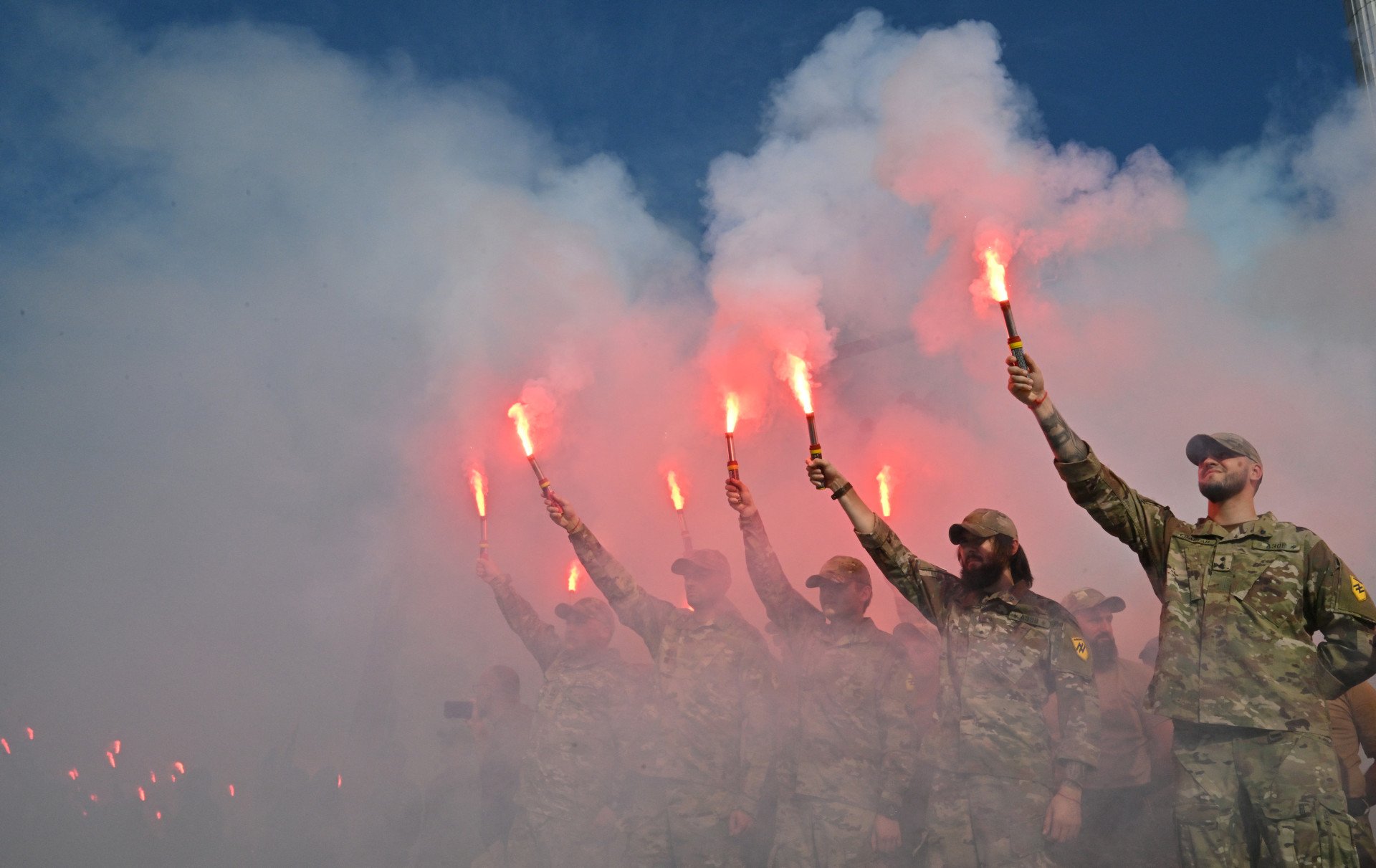
Today, July 29th 2024, marks two years since an explosion killed 51 and injured at least 139 Ukrainian prisoners of war (POWs) held by Russian forces in the Olenivka penal colony, in the temporarily occupied region of Donbas. A survivor of Olenivka tells us what she knows about the attack, what life was like for her inside the prison, and how, she says, the Red Cross failed to fulfill their duties.
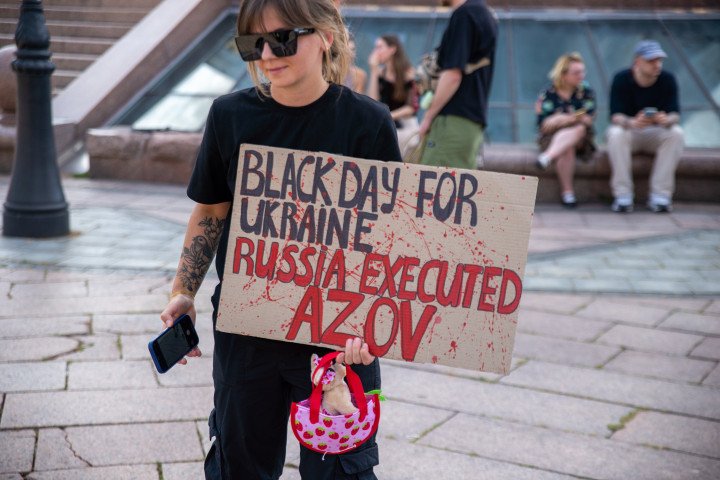
The night of the massacre
Olenivka imprisoned mainly Ukrainians from Mariupol and the Azovstal steel plant who had surrendered to Russian forces. On July 29th 2022, an explosion hit an area of the prison killing 51 and injuring at least 139 Ukrainian POWs. Days before the attack Russian forces had made some unusual changes in the camp.
A report from the Office of the High Commissioner for Human Rights (OHCHR) stated that 193 POWs, all of the ‘Azov’ regiment, were rounded up and moved to a refurbished section of the colony days leading up to the attack. After they were moved, the guard post was moved further back from the prison barracks, the guards began to wear bullet-proof vests and helmets, and the relocated POWs were ordered to dig trenches for the guards, none of which had been done before. A couple of days later, the building which they were moved to, was hit.
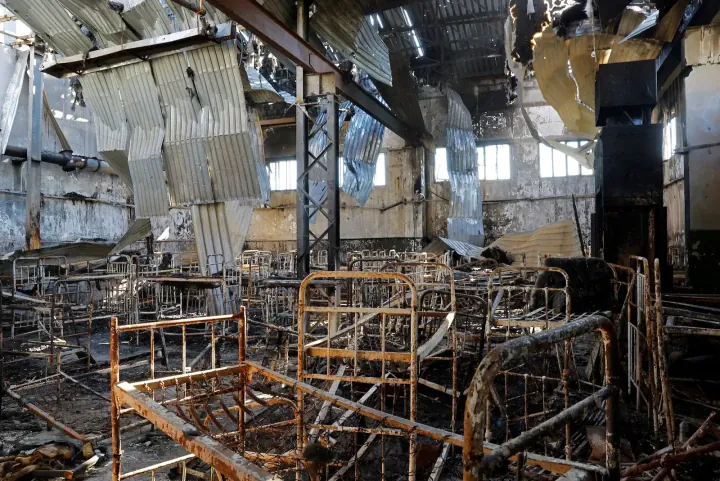
“Russian forces said that their previous barracks were being repaired so that the POWs could live there during winter. But it was a lie, they moved them for a reason, they planned to destroy these young fighters and blame Ukraine for it,” Tetyana—a volunteer medic of the Hospitallers Battalion and released POW of Olenivka, with the call sign ‘Borysivna’—told us.
“The guards locked us women in our cells and ran into the basement when the shelling began. There were two powerful explosions. We all lay on the floor. We could see through a small window that they had hit somewhere in the industrial zone of the camp, we didn’t understand what was happening.”
“In the morning, some of the wounded were brought into one of the cells of our building, which is when we learned a little bit about what had happened. Many boys burned, others died later because they were not given help,” she said.
The investigation into the attack:
Russia blamed Ukraine for the attack claiming the prison had been struck with Ukrainian HIMARS, which the UN investigated and categorically dismissed. The OHCHR stated that evidence shows the artillery that struck that night followed an east-to-west trajectory, from the direction of Russia to Ukraine.
POWs are protected under international humanitarian law (IHL), requiring humane treatment and obliging the detaining power to ensure their safety. Any suspicion of criminal conduct must be promptly, independently, and impartially investigated, and those responsible must be prosecuted. Despite this, Russia refused to give the OHCHR access to the site to investigate.
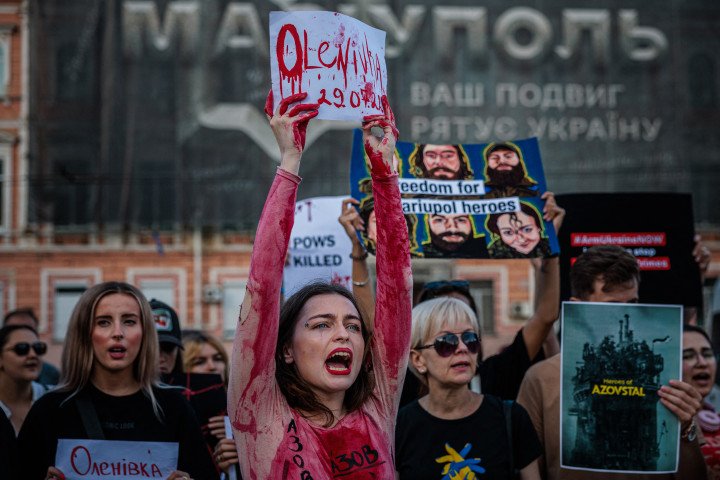
The OHCHR report states that the number of POWs that died due to the attack would have been “considerably lower” if the injured were provided with prompt medical care. Survivors had to do what they could to try and help stop each other's bleeding. Multiple died at the entrance of the colony due to significant blood loss. A Ukrainian civilian detainee who acted as a liaison for the administration, ordered the POWs who cleared debris and removed dead bodies to keep silent about what they saw.
The report also “faulted Russia for keeping prisoners of war in the proximity of the front line in violation of IHL.”
“The authorities of the Russian Federation took steps that impeded independent efforts to establish the facts about the explosions at Olenivka. The scene was not preserved but was instead contaminated, with physical evidence disturbed,” said the OHCHR this week.
Interviews with witnesses and survivors of Olenivka penal colony have been an integral part of investigations.
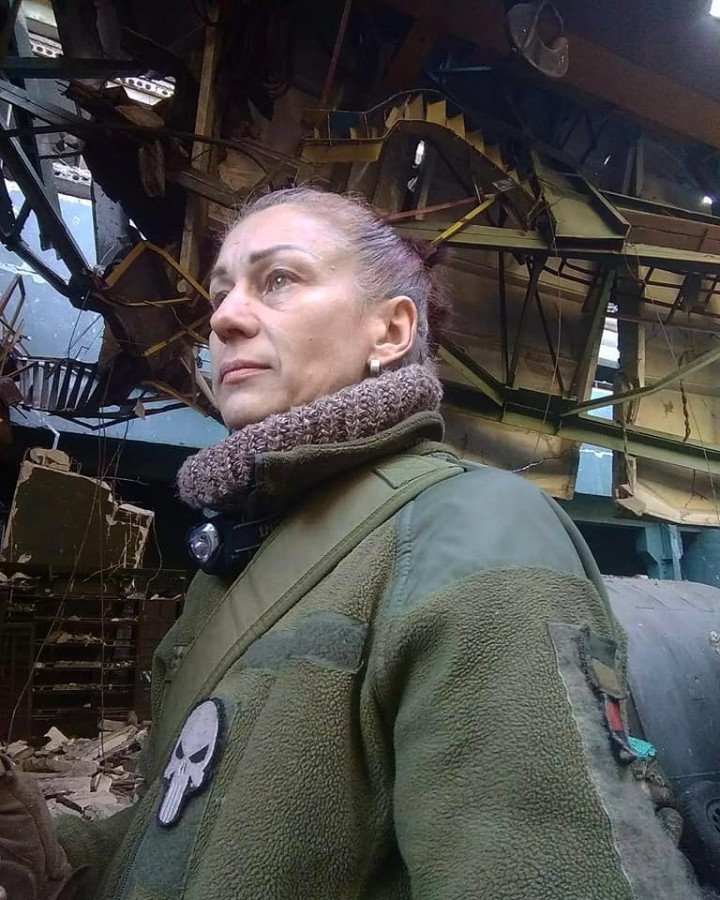
Before Olenivka, the full-scale invasion and failures of the Red Cross:
Borysivna and other members of her team with call signs ‘Dream’ and ‘Bison’, also volunteer medics from the Hospitallers Battalion, were in Olenivka at the time of the attack. Before capture, they were positioned in the Vodyane village near Mariupol, when the full-scale invasion began in February 2022.
After a brutal battle trying to escape Mariupol during the first weeks of full-scale war, they made it to Ilyich Iron and Steelworks before moving to Azovstal steel plant, then being handed to Russian forces and taken to Olenivka. Borysivna has since been released, but Dream and Bison are still in Russian captivity.
Borysivna says that during the Azovstal and Olenivka exchange, the records and information of Dream and Bison were not recorded and she was not visited by ICRC (International Committee of the Red Cross) representatives while in captivity.
Ukraine's Human Rights Ombudsman Dmytro Lubinets said that most Ukrainian prisoners of war have never been visited by the ICRC while in Russian captivity.
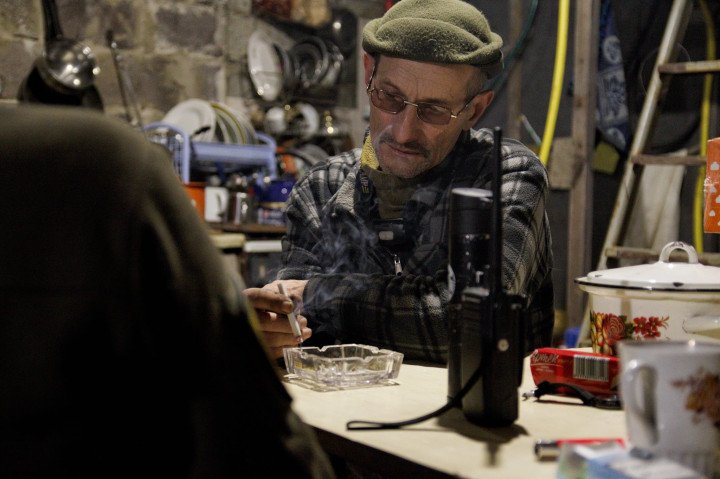
“Where we sit right now, new Russian soldiers rotated two weeks ago, they are just a couple of hundred meters away. Now there is silence, but silence is deafening, it's the calm before the storm,” Dream tells me as we sit in an abandoned house in the destroyed Vodyane, Donbas village in 2022. A few weeks before the full-scale invasion of Ukraine, I was embedded with Borysivna, Dream and Bison, and spent time documenting their work. Since then I have since been following their stories.
“My grandchildren are growing up to live in a country with war, I want this to be over and to protect them from this. There is no point in hope, hope won’t bring us peace. I’m not expecting a positive outcome for Ukraine,” Dream continues.
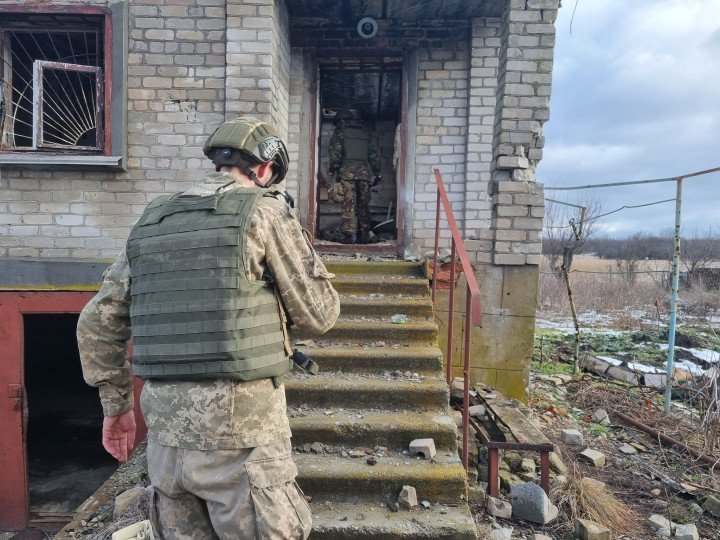
We took a walk around the village, “over there,” Bison said, pointing towards Russian positions. “They're so close, if you listen carefully, we can hear them talking, if the wind blows in our direction, we can smell their cigarettes.” Though they expected the worst, they hadn't imagined being held in captivity for more than 2 years. Just a day before the full-scale invasion, the last message I received from Dream read, “they’ve hit us with Su-300s, it’s getting more intense.”
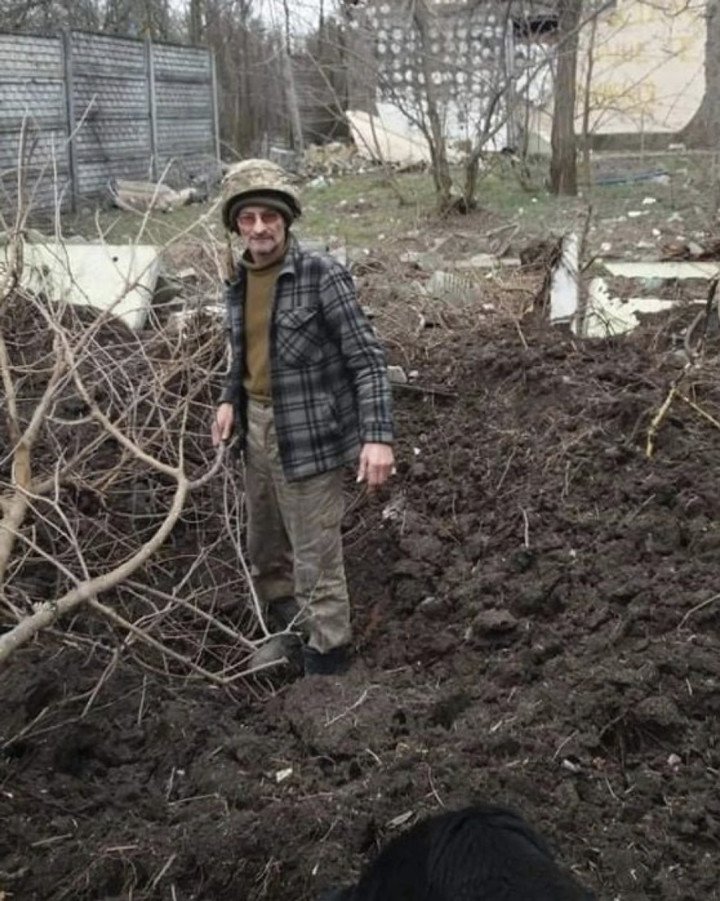
Borysivna continues to fight for the release of Dream and Bison. She tells me what it was like for her inside Olenivka prison, and how the ICRC has failed her team.
Were you interrogated in Olenivka?
In the beginning, it wasn't so scary. When we arrived, there was an inspection to check that we hadn’t brung anything prohibited. We were allowed to take hygiene products and clothes into the cell. Our cell was designed for 6 people but we had more than 20 women sleeping on the floor. They fed us 3 times a day, porridge and a small piece of bread. At that time, the food was better than what we had in Azovstal.
Dream got to Olenivka on May 16, 2022, he helped carry out the seriously wounded on the first day of capture. Bison and I arrived to Olenivka on May 19th.
After May 21st, when all the Ukrainian defenders were in Olenivka, FSB interrogations began. Almost every day we were taken in small groups for interrogations by the FSB, the Russian Prosecutor's Office and the DPR (Donetsk People's Republic).
Then they started bringing Ukrainian soldiers to our building for interrogations and to torture them. We all heard how the boys were being beaten, they were screaming. Once I saw, through the small window of my cell, a dead body being carried out after being tortured.
This is how they tried to force the women to cooperate with them. And, unfortunately, some women agreed for food or for the possibility of access to fresh air, but those were isolated cases. For women it was more psychological torture because we heard everything but could not do anything about it.
We were visited by a representative of the FSB who told us that the left bank of the Dnieper was occupied by Russian forces and that Ukraine doesn’t want to save us, that our state does not need us.
They suggested that we sign documents to state that we want to stay in the occupied region, the DPR (Donetsk People's Republic), only then we would be able to be free. They said if we gave an interview stating that we are staying in the DPR, they would let us call our family. We were humiliated and insulted. I personally did not see women being beaten, but it was very difficult for us psychologically.
What was your daily routine?
The day began with a count of the prisoners in the cells, sometimes we were taken out into the corridor, then they brought us a little food. We wanted to eat all the time, we had very little food and were never full.
We would spend the day talking to each other, supporting each other. Once in a while we could go outside in small cells with bars over our heads. We could see the sky!
In the cell, I spent a lot of time just lying with my eyes closed and remembering the pleasant moments of my life, or dreaming about what I would do when I returned home. It helped my mental state.
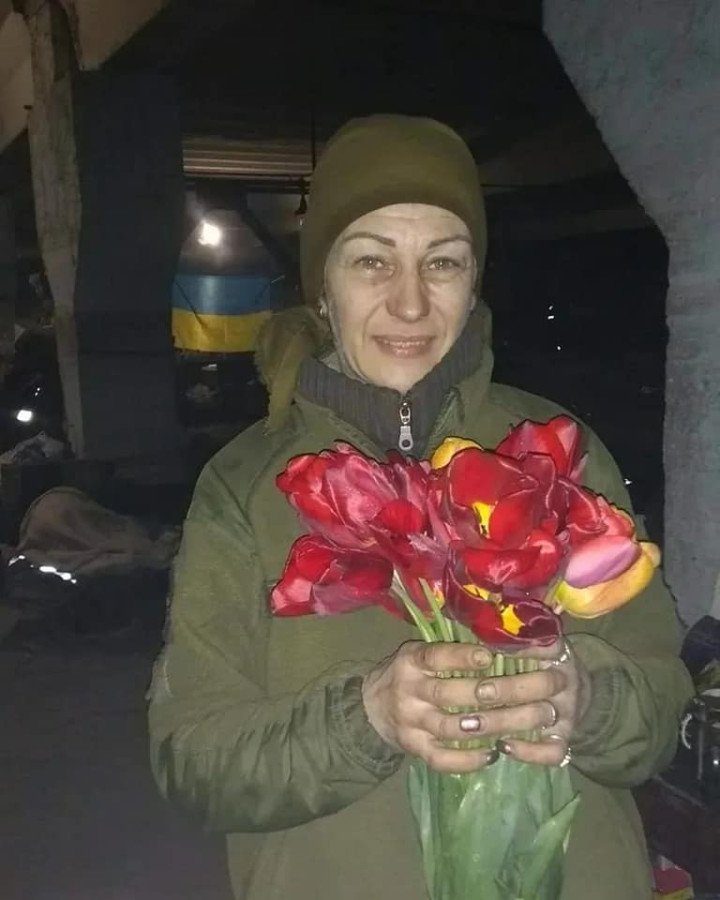
What were the conditions of Olenivka?
We, women, were subjected to psychological pressure, sometimes we were not allowed to go outside for weeks, the food was terrible, there were too many of us in a small cell. The guards called us bad names and tortured us with lies. When someone was sick, they refused to tell a doctor or give us medicine. They said that they had nothing to give because the Ukrainian military took everything away—I knew this was a lie.
Olenivka is an old juvenile colony that has not been used for many years. There was no water, heating, only light, the sewers were constantly clogged, and the very little water we had, was brought in tankers on fire trucks.
We were taken to shower once a week, there were two faucets and we were only given 10 minutes to wash. Men were kept separately in barracks, and we were in isolation cells. There was a canteen where the men were taken to eat, but food was brought to the women's cells.
How efficient were ICRC representatives during your exchange between Azovstal and Olenivka?
When we left Azovstal, after being searched, we were put on buses to be taken to Olenivka. On my bus two representatives (foreigners) of the Red Cross came and handed out questionnaires for us to fill out. They said that they would inform the government authorities and family where we were and that we were alive. When I handed in the questionnaire, a woman from the Red Cross saw that I had written that I was a Hospitaller and promised to contact my daughter—she did.
But not all buses going to Olenivka were visited by the Red Cross. The Russians either did not let them onto the bus, or quickly kicked them off. Neither Dream nor Bison filled out these questionnaires. I saw Dream in Olenivka on the way to the interrogation room and we were able to say a few words to each other, that’s when he told me their details were not recorded. The Ukrainian Government nor their families knew where they were.
It's not not only Dream and Bison who were deprived of the opportunity to fill out the Red Cross questionnaire, there are many others too. The Red Cross made absolutely no effort to fulfill their obligations. Yes, they may not have been given the opportunity to fulfill their duties, but they did nothing to ensure that the Russians followed the rules of treatment of prisoners according to the Geneva Convention.
The Red Cross came to Olenivka several times, but they did not enter the buildings to talk to us, they were the Russian Red Cross. There were representatives of the press, also Russian, and they didn't communicate with us either.
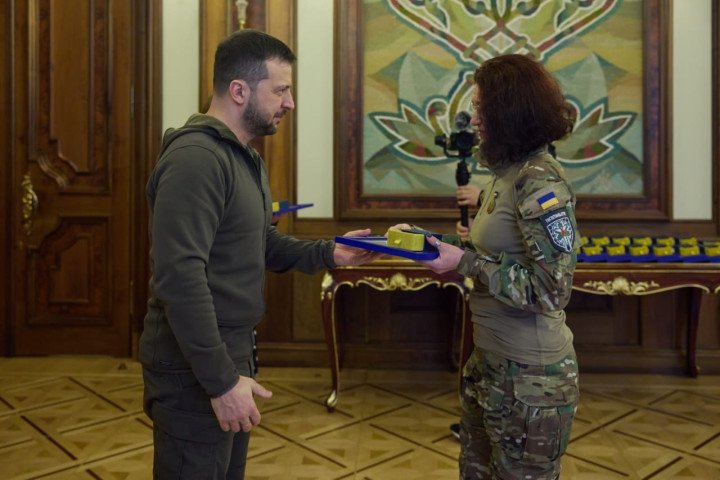
What happened during your release?
At the end of the summer 2022, many prisoners began to be moved from Olenivka to other colonies because the Russians realized that if they kept people here during winter, they would also suffer due to its conditions.
I think Dream and Bison were taken out before me. I was released on October 17, 2022, it was the largest exchange of women (108 women). During that time, I was transported to various colonies in Russia; Shebekino in the Belgorod region, a colony in the Kursk region, and a detention center in Taganrog, Rostov region. Then I was sent to Dzhankoy, Crimea, and from there to the Zaporizhzhya region for exchange.
After my release, I found where Dream and Bison were by working with the coordination headquarters and the national information bureau. Bison is definitely in a colony in the city of Horlivka, Donetsk region. Dream may be located in the Volgograd region, Russia. But that's very old data, unfortunately, I don't know anything at the moment.
What is being done to support the release of Dream and Bison?
I didn’t receive any real support from the Red Cross at all. Since discharge, my battalion has taken care of me along with a couple of volunteer organizations. I am also very grateful to the office of the ombudsman and the Crimean platform for the opportunity to rest in Albania in May this year, with my daughter and granddaughter. I met the Albanian Parliament together with the ambassador of Ukraine to Albania to discuss Russia's crimes.
I have full confidence in the Office of the Ombudsman and believe that they are doing everything possible to release all the prisoners.
But, unfortunately, it's Russia who determines who will be on the lists for each exchange. They mentally manipulate Ukrainians, claiming that it is our side that doesn’t want to have anyone released. In June, I appealed to the Pope of Rome with a request to facilitate the release of the civilian medics of our crew. But so far there is no result.
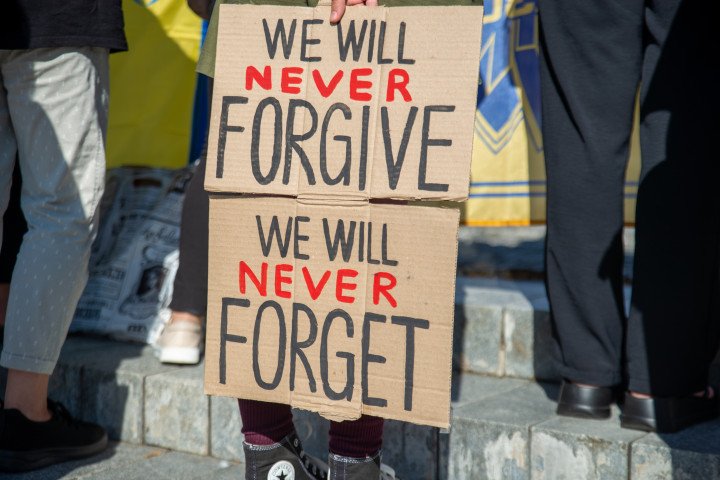
-46f6afa2f66d31ff3df8ea1a8f5524ec.jpg)
-35249c104385ca158fb62273fbd31476.jpg)


-554f0711f15a880af68b2550a739eee4.jpg)



-206008aed5f329e86c52788e3e423f23.jpg)